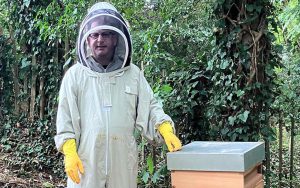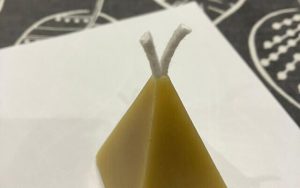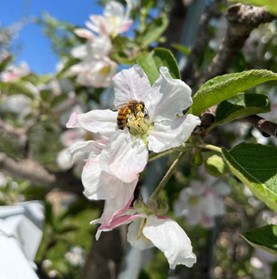In London, a Jewish beekeeper draws honey and spirituality from his hives
For David Roth, the hobby he picked up during the COVID pandemic is not only a source of sweetener and wax, but also inspiration
By CANAAN LIDOR

David Roth extracts honey from his beehive in London. (David Roth)
Finding a memorable Rosh Hashanah gift to give friends is rarely an issue for David and Judy Roth, a Jewish couple from London. They simply giftwrap one of the jars of honey that they extract regularly from the beehive in their backyard.
That product, which is traditionally eaten with apples on the Jewish new year, and the candles the Roths produce from beeswax, are a big part of the reason for the couple’s decision three years ago to join two other Jewish couples and invest time and money in apiculture, with the risks it entails.
Gradually, though, the honey took a backseat to the joys and spiritual insights that the new hobby afforded, David Roth, 61, said.
“I didn’t expect that I would think this way, but getting the honey is a nice additional benefit. Frankly, though, it’s not the main thing,” said Roth, a marketing executive who has three children with his wife Judy, a nurse.
Roth is fascinated by the intricacies and multiple unsolved scientific mysteries concerning bee behavior, he said. But beekeeping also has a strong spiritual element for him.
“I’m a religious person, I don’t believe that the world was created by accident. And when you see the wonders of how bees work and operate, it makes you feel good about God,” Roth, who uses the beeswax candles for Havdalah, the prayer ritual performed at the end of Shabbat, told The Times of Israel earlier this week.

David Roth uses candles that he and his wife Judy make from beeswax for weekly prayers after Shabbat. (David Roth)
London Jews have been flirting with beekeeping since at least 2011, when a local Jewish community center launched what it called the “Bee The Change” initiative, through which the center helped train two urban beekeepers from the community.
The Roths and their fellow Jewish beekeepers, however, took up the hobby during the COVID-19 lockdown, receiving guidance from a non-Jewish community center that launched the activity as part of its lockdown coping program. The Roths, who go to an Orthodox synagogue in the northwest neighborhood of Pinner in London, soon discovered that beekeeping resonated with their religious side, as well.
As a religion with deep agricultural roots, Judaism has a well-documented approach to apiculture, encompassing both the keeper’s responsibility toward their bees and detailing the legal complications that can occur when a swarm leaves its hive.
Beekeeping is one of the few situations when children can serve as witnesses according to Halachah, Jewish Orthodox law. It stipulates that if a child testifies that a swarm originated in an owner’s beehive, then the swarm can be returned to the owner based on the testimony.
Another rare exception, which attests to the significance that beekeeping had before humans learned to mass produce sugar: Bee owners may trespass – a big deal in Judaism – to retrieve escaped or errant bee swarms. They may even cut down branches of other people’s trees — another big deal — but are obliged to compensate the land’s owner for any damage they cause, according to what Rabbi Avraham Laber, himself a beekeeper and co-director of Chabad-Lubavitch of Southern Rensselaer County in New York, told Chabad.org in 2019.
One nonprofit in the United States, Bees for Peace, encourages as part of its mission statement rabbis, imams and priests to launch beekeeping projects in their communities for the spiritual aspect of the experience.
It doesn’t take clergy to appreciate how bee societies offer takeaways for life as a human.
“It’s an amazing reflective experience and it’s where humanity and nature sort of combine,” Roth said. Observing bees gave him “an immense appreciation for the marvel of God or nature, depending on your perspective,” Roth added.
An average colony has 50,000 individuals, he noted, and “all have a role and a purpose to them. They look after each other. None of the bees go to bee school. They instinctively learned it. It’s a micro-society, which doesn’t suffer from social media, by the way.”
Beekeeping isn’t for everybody: It can be done on a rooftop but ideally, it happens in a yard large enough for the hive to be kept away from windows. David and Judy Roth planted bee-friendly plants and have stopped trimming a portion of their garden to let it grow wild for the bees.
Extracting the honey requires special equipment and skill. The bees need to be fed throughout winter – their sustenance, in lieu of honey, is sugar water – and cared for to survive…..
To read the complete article go to; In London, a Jewish beekeeper draws honey and spirituality from his hives | The Times of Israel
We are here to share current happenings in the bee industry. Bee Culture gathers and shares articles published by outside sources. For more information about this specific article, please visit the original publish source: In London, a Jewish beekeeper draws honey and spirituality from his hives | The Times of Israel








